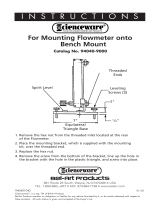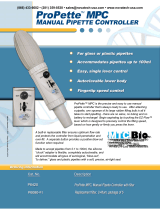Page is loading ...

INSTRUCTIONS
Vacuum Aspirator Collection System – HiFlow
Catalog No. F19917-0250
NOT FOR USE WITH FLAMMABLE LIQUIDS OR MATERIALS
Power Supply Input Ratings:
- Supply Voltage: 90-240 Vac
- Frequency: 50-60Hz
- Current: 1.0 Amps
Vacuum Pump Ratings:
- Voltage: DC 12.0+/-1%
- Amperage: 2.6 Amps
For indoor use only
Altitude up to 2,000 M
Operating temperatures 5-40 degrees C
Max relative humidity 80% to 31 degrees C,
decreasing linearly to 50% at 40 degrees C
Caution label on bottle:
When under vacuum follow laboratory safety
precautions and use appropriate personal
protection equipment.
For instructions for standard Vacuum Aspirator Collection System, catalog number F19917-0150,
please refer to instruction sheet 919917156 and use filter number F19917-0155.
The Scienceware® Vacuum Aspirator Collector and Pump are ideal for easy and continuous
vacuum aspiration of a variety of liquids, including tissue culture media, supernatants, and cell washing
solutions, from Petri dishes, microtiter plates, flasks, centrifuge tubes, and more. It even works with
eight channel tips!
The 3.8L (1.0 gallon) collection bottle is made of heavy-wall polypropylene and is chemical and
corrosion resistant, while the replaceable hydrophobic filter (included) protects the vacuum pump
from fluids. The collection bottle rests in the stand above the vacuum pump housing resulting in
a neatly organized and compact design that won’t crowd the workspace. The lid on the collection
bottle contains a safety release vent that prevents vacuum implosion. This version also includes
labor saving quick disconnect fittings for a quicker change out of bottles.
Please review these instructions for Assembly and Operation before using this product. WARNING:
When using this product under vacuum, always use standard laboratory precautions. If the
equipment is used in a manner not specified by the manufacturer, the protection provided by
the equipment may be impaired.
ASSEMBLY:
1. Identify the blue screw cap lid for the collection bottle. Screw the lid onto the collection
bottle. Place the bottle on the vacuum pump housing.
2. Attach the tube with the hydrophobic filter on to the barbed end of one of the quick
disconnect fittings.
3. Attach the tube from your aspirating device to the other barbed quick disconnect fitting.
4. Identify the power cables that will fit your electrical outlet type and insert it into the power
supply. Insert the round jack from the power supply into the power connection on the rear
of the vacuum pump housing. Do not replace cords with inadequately rated cords.
5. Plug the power source into your grounded wall outlet that can be easily accessed
and disconnected.
OPERATION:
6. Insert a Pasteur pipette, regular pipette, 8 channel pipette or a pipettor tip of appropriate
diameter into the free end of the aspirator tubing.
7. Flip the On/Off switch to the On position (red light will illuminate) and begin your aspiration
process.
8. When the collection bottle is approximately 2/3 full, flip the On/Off switch to Off position.
9. Disconnect at the quick disconnect fittings to remove tubes from the bottle.
10. Remove the collection bottle from the vacuum pump housing.
11. Unscrew the lid, treat, and dispose of the contents in accordance with all federal,
state and local regulations.
CAUTION:
The hydrophobic filter protects the vacuum source from fluid contamination. Do not operate the
pump without a hydrophobic filter in place as there will be no protection against fluids flowing into
the vacuum pump and damaging the pump. Such damage is not covered by the warranty.
Do not allow the collection bottle to overfill as this will cause fluids to flow into the vacuum trap.
If fluids overflow the collection bottle and wet the filter it will seal itself and prevent air or liquids from
passing through to the pump motor. The pump will continue to run, but suction at the aspirator tip
will cease. Should this happen, it is important that you flip the On/Off switch to Off position to avoid
burning out the pump motor. A bag of 6 replacement hydrophobic filters are available under part
number F19932-1920. Not for use with flammable liquids.
Bel-Art – SP Scienceware assumes no obligation or liability for any advice furnished by it,
or for results obtained with respect to these products.
All such advice is given and accepted at the buyer’s risk.
© 2015. All Rights Reserved.
Bel-Art® – SP Scienceware® is a division of SP Industries, Inc.
661 Route 23 South, Wayne, NJ 07470
TEL: 1-800-423-5278 • FAX: 973-694-7199 • www.belart.com 919917280 – 07/15
CLEANING:
Treat, and dispose of the contents in accordance with all federal, state and local regulations.
The vacuum pump housing is made from durable, chemical-resistant polypropylene. It can be
wiped with bleach solution or other laboratory disinfectants as needed. All of the supplied tubing is
PVC Tubing with a 1/4” I.D. and 3/8” O.D. It can be flushed with bleach solution or other laboratory
disinfectants as needed. Autoclaving is not recommended as it will turn the clear PVC opaque and
may weaken the tubing. The 1.0 gallon collection bottle, and quick disconnect fittings are made
from durable, homopolymer plastic. They can be wiped with bleach solution or other laboratory
disinfectants as needed. Autoclaving is not recommended as it may damage the safety release
vent.
SAFETY VENT TESTING PROCEDURES:
Periodically test safety release valve by running pump, with an empty bottle, and close off
suction hose. After 1-2 minutes you should hear air passing through the valve. This means the
valve is working properly. If you do not hear any air passing through the valve, turn off the pump
and replace the valve.
Please use appropriate precautionary procedures for chemical or biological materials, wear
appropriate personal protective equipment and use under a fume hood if applicable.

INSTRUCTIONS
Replacement Hydrophobic Filters For
Vacuum Aspirator Collection System – HiFlow
Not for use with standard model, catalog no. F19917-0150
Catalog No. F19917-0255
For use with the Bel-Art - SP Scienceware® Vacuum Aspirator
Collection System - HiFlow (F19917-0250), this hydrophobic
filter should be replaced whenever collection bottle overflow
has wet the filter and caused an interruption in vacuum.
NOTE: The hydrophobic filter protects the vacuum source
from fluid contamination. Do not operate the pump without
a hydrophobic filter in place as there will be no protection
against fluids flowing into the vacuum pump and damaging
the pump. Such damage is not covered by the warranty.
INSTRUCTIONS:
REMOVE OLD FILTER:
1.
Grasp the filter and pull it out of each
of the two tube ends.
2.
Discard the filter in accordance with all federal,
state and local regulations.
INSTALL NEW FILTER:
3. Push each of the two tube ends on the Bel-Art - SP Scienceware® Vacuum Aspirator Collection System -
HIFlow (F19917-0250) on to each of the barbed fittings of the hydrophobic filter. There is no flow direction
to be concerned with.
4. You are now ready to resume normal operation of the system.
If you need instructions for the Bel-Art - SP Scienceware®
Vacuum Aspirator Collection System - HiFlow (F19917-0250),
please contact Bel-Art Customer Service at 1-800-423-5278
and ask for a copy of Instruction Sheet # 919917280.
Bel-Art – SP Scienceware assumes no obligation or liability for any advice furnished by it,
or for results obtained with respect to these products.
All such advice is given and accepted at the buyer’s risk.
© 2015. All Rights Reserved.
Bel-Art® – SP Scienceware® is a division of SP Industries, Inc.
661 Route 23 South, Wayne, NJ 07470
TEL: 1-800-423-5278 • FAX: 973-694-7199 • www.belart.com 919917400 – 06/15
/













